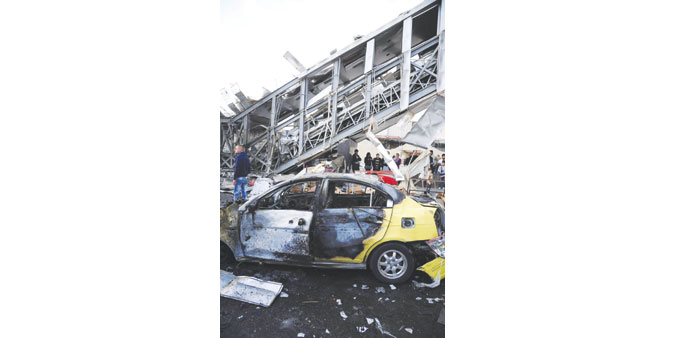The Syrian government and opposition held fast yesterday to their uncompromising stances toward each other, a day after a date was set for them to sit down for peace talks.
The opposition National Coalition repeated its long-standing rejection of President Bashar al-Assad having any role in Syria’s future, while the regime said it would press on with its war on “terrorism”.
A day after the UN announced the two sides would hold a Geneva peace conference on January 22, the war showed no signs of abating.
A car bomb killed 15 people at a bus stop west of Damascus, state television reported.
And fighting raged on key fronts east and north of the capital, in a 32-month conflict that has killed more than 120,000 people and uprooted millions more.
The Coalition said it “affirms its absolute rejection of Assad or any of the criminals responsible for killing the Syrian people playing any role in a transitional body... or in Syria’s political future”.
But it said it considers as “very positive” that a date has been set.
It also said that, in preparing for what has been dubbed Geneva 2, world powers must “ensure humanitarian supplies reach all areas of Syria, while all prisoners must be set free” and that there should be “an immediate end” to massacres.
The conference must “implement all the provisions of Geneva I”, which in June 2012 envisaged the creation a transitional government, but did not stipulate that Assad should step down.
Rebel chief Selim Idriss said the Free Syrian Army would be ready to go to the talks if conditions including Assad’s fall are met.
“If we receive proposals that lead to the realisation of the demands of revolutionaries on the ground, we will take part,” Idriss told Al Jazeera.
For its part, the regime has rejected any preconditions to the talks. Assad himself has said he would be willing to run for re-election in 2014.
Pro-regime daily Al Watan quoted a letter from Foreign Minister Walid Muallem to the United Nations as saying “the war against the terrorism that is targeting Syrian citizens is key to ensuring the success of any peaceful solution.”
“An end to violence and terrorism requires the countries that support the armed terrorist groups... stop arming, funding and giving them logistical support,” he added.
On the ground, state television said a suicide bomber blew up a car in front of a bus stop in Somariyeh, west of the capital, killing at least 15 people and wounding more than 30.
The Syrian Observatory for Human Rights also reported the blast, adding that two of those killed were children and six were soldiers.
The bombing came after mortar fire on parts of Damascus killed six people, including two children, the Observatory said.
It also came as rebels, including Al Qaeda loyalists, pressed an offensive to lift a year-long army siege of their positions in eastern suburbs of Damascus.
Eight rebel commanders are among scores of fighters killed on both sides in the past four days, said the Observatory.
Fighting raged in Adra, a strategic town northeast of the capital, while the army pounded the besieged rebel enclaves of Douma and Marj to its east.
Fighting also raged in the Qalamoun mountains north of Damascus, a border area where the army has been battling to cut rebel supply lines to neighbouring Lebanon.
Health Minister Saad al-Nayef accused the rebels of killing “five doctors, five nurses and two ambulance drivers” in the Qalamoun town of Deir Attiyeh after they seized it from the army last week.
In Nabuk, another rebel-held town in the region, government air strikes killed at least seven people, including three children, the Observatory said.
Four other children were killed in government shelling, this time in a village in the northern province of Aleppo.
In other developments, a report by Syria’s Export Development Organisation said foreign trade has virtually collapsed since the uprising began in March 2011.
Exports, including petroleum, have dropped by 95%, said the report, while imports have plunged by 88%.

